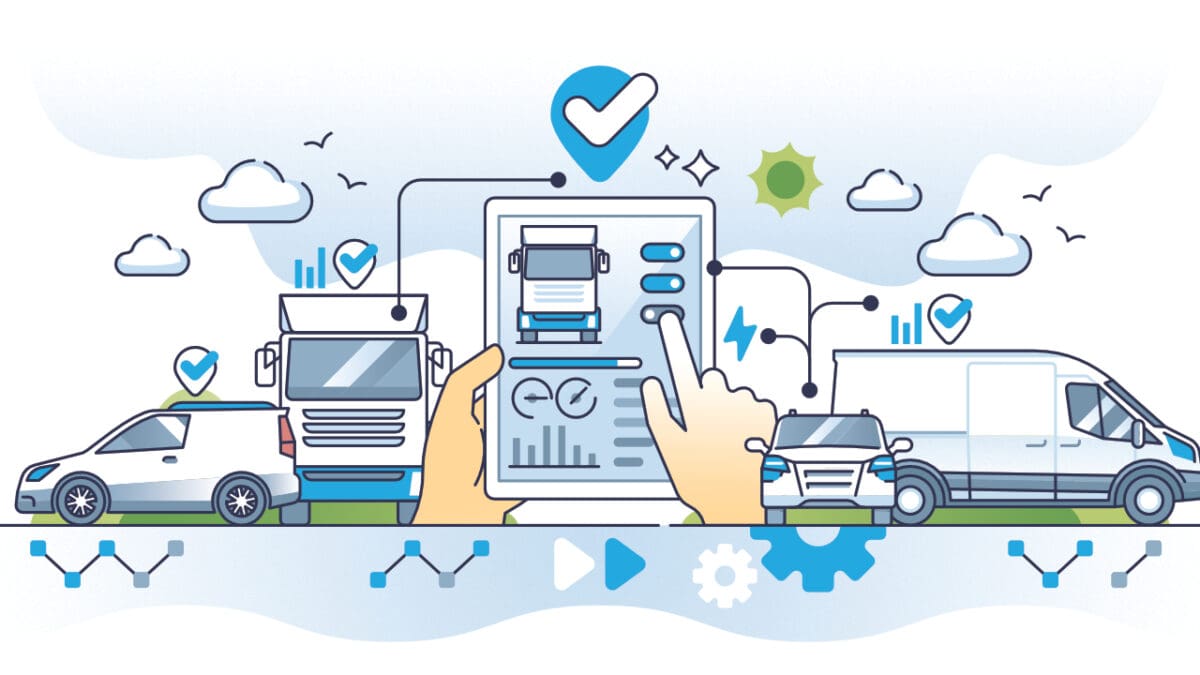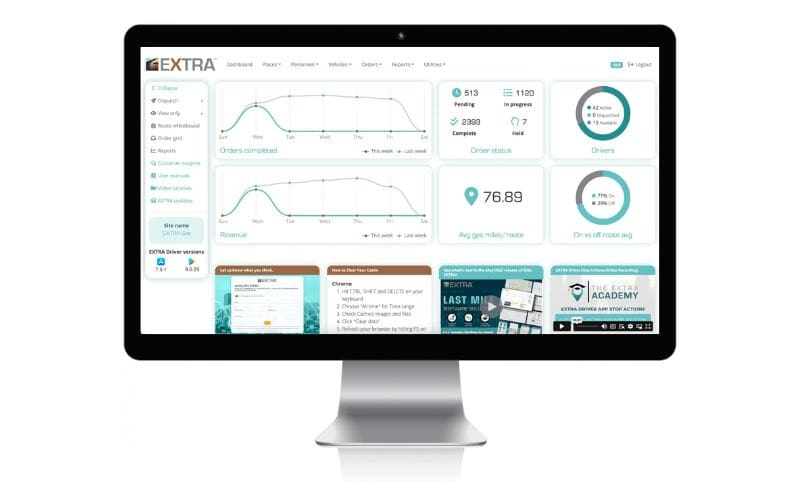
In the dynamic world of last-mile delivery, understanding the transformative power of fleet management software is crucial for every fleet investor. Are you ready to elevate your operational efficiency and productivity? As technology continues to advance, staying ahead means finding and using the right tools to streamline your operations, mitigate risks, and optimize costs.
Today, we’re talking about the extraordinary features of fleet management software and how these innovations can revolutionize your last-mile delivery services. If your goal is operational excellence, discover how the right fleet management solution can help you achieve that.
8 Essential Features of Fleet Management Software
Explore the eight essential features of fleet management software designed to enhance your fleet operations, improve safety, and support your business in the challenging domain of last-mile delivery.
1. Enhanced GPS Tracking
GPS tracking stands as the backbone of modern fleet management, offering a multifaceted approach to overseeing fleet operations. By harnessing satellite technology and cellular networks, fleet managers gain unparalleled visibility into the whereabouts and activities of their vehicles, inventory, and equipment. But it’s not just about knowing the location. It’s about having that knowledge to drive efficiency, safety, and customer satisfaction.
KEY FEATURES OF ADVANCED GPS TRACKING:
- Precision Location Map Charting: Visualize the precise location of each asset in your fleet with highly detailed maps. This feature is a tool for managers and a reassurance for customers who value transparency and timely deliveries.
- Customizable Alerts: Tailor alerts to fit the unique needs of your operations. Whether it’s unauthorized vehicle usage, deviations from planned routes, or entering designated geofenced areas, these alerts keep you informed.
- Real-Time Location Tracking: Monitor your fleet’s movements as they happen. This real-time insight is crucial for making informed decisions, responding to unexpected situations, and ensuring that your operations run smoothly.
- Route Optimization, Re-Routing, and Scheduling: Navigate the complexities of route planning with intelligent software that considers traffic, weather, and vehicle capacity. The ability to adjust routes on the fly and optimize scheduling ensures that your fleet operates at peak efficiency.
- Customer ETA Notifications: Keep your customers informed with accurate, real-time ETAs. This feature enhances the customer experience by setting clear expectations and demonstrating your commitment to timely, reliable service.

THE IMPACT OF ADVANCED GPS TRACKING
Incorporating these GPS tracking features into your fleet management software can be transformative. With customizable alerts, you’re actively managing your fleet. Real-time tracking and dynamic route optimization empower you to make decisions that reduce costs, save time, and improve service quality. By providing customers with real-time ETA notifications, you’re delivering goods and peace of mind.
2. Strategic Fuel Management
Fuel management is crucial in last-mile delivery, where fuel costs significantly impact operational expenses. Advanced fuel management in fleet software offers real-time monitoring and insightful analytics, enabling managers to track fuel levels, and consumption patterns, and identify inefficiencies or unauthorized usage.
KEY FEATURES INCLUDE:
- Real-Time Monitoring: Track fuel levels and consumption in real time, ensuring optimal usage and immediate decision-making.
- Fuel Analytics: Transform data into actionable insights to reduce waste and support sustainability.
- Leak and Theft Detection: Quickly identify discrepancies in fuel levels to address potential leaks or theft.
The US Department of Transportation’s new Corporate Average Fuel Economy (CAFE) standards underscore the industry’s move towards efficiency. By 2026, the expected fleet average for cars and light trucks is about 49 mpg, with an 8% annual efficiency increase for 2024-2025 and 10% for 2026 (US Department of Transportation).
3. Proactive Alerts and Notifications
Staying ahead of potential issues while managing your fleet is key to maintaining smooth operations. Alerts and notifications in fleet management software act as an early warning system, enabling managers to proactively address situations before they escalate. This feature anticipates and prevents potential issues, ensuring uninterrupted productivity and safety.
ESSENTIAL FUNCTIONS OF ALERTS AND NOTIFICATIONS:

- Real-Time Updates: Receive instant alerts on critical events, such as unauthorized vehicle usage, maintenance needs, or deviations from planned routes. This immediate information allows for swift action, minimizing downtime and potential risks.
- Customizable Alerts: Tailor notifications to meet the specific needs of your fleet. Whether it’s monitoring driver behavior, vehicle performance, or compliance with regulations, personalized alerts ensure that you’re focusing on what matters most to your operations.
- Enhanced Communication: Facilitate seamless communication between fleet managers and drivers. Alerts can prompt drivers to take necessary actions, like adjusting routes or performing vehicle checks, promoting a collaborative approach to fleet management.
Incorporating a robust alert and notification system into your fleet management software is a strategic investment in the efficiency, safety, and resilience of your fleet.
4. Optimizing Driver Performance, Behavior, and Retention
Drivers are the linchpin of operational success in fleet management. Monitoring and enhancing driver performance, behavior, and retention is crucial for maintaining high safety standards and ensuring the longevity of your fleet. Advanced fleet management software provides a comprehensive suite of tools designed to offer deep insights into driver activities, fostering a culture of safety and continuous improvement.
KEY FEATURES FOR DRIVER MANAGEMENT:
- Behavioral Analytics: Utilize sophisticated algorithms to analyze driving patterns, identifying areas for improvement and recognizing exemplary performance. This data-driven approach not only promotes safety but also encourages a positive driving culture.
- Performance Metrics: Generate detailed reports on key performance indicators such as speed, idling time, and route adherence. These metrics provide a clear picture of driver behavior, enabling targeted training and development programs.
- Retention Strategies: Use insights from performance data to implement retention strategies. Recognize and reward top performers, address areas of concern, and create a supportive environment that values safety and efficiency.
By prioritizing driver performance, behavior, and retention, fleet management software plays a pivotal role in shaping a fleet that’s operationally proficient and committed to safety and sustainability. It’s an investment in the human element of your fleet, ensuring that your drivers are equipped, motivated, and recognized as the key drivers of your success.
5. Streamlined Fleet Maintenance
Efficient fleet maintenance is the cornerstone of a high-performing last-mile delivery service. The key is proactively preventing problems before they happen rather than putting out fires as they arise. Advanced fleet management software offers comprehensive maintenance features that ensure your fleet operates at peak efficiency, ultimately maximizing ROI and extending the lifespan of your vehicles.
CRUCIAL ELEMENTS OF FLEET MAINTENANCE:
- Preventive Maintenance Scheduling: Automate maintenance tasks based on time, mileage, or engine hours. This proactive approach prevents unexpected breakdowns, ensuring your fleet is always ready for the road.
- Real-Time Malfunction Alerts: Receive instant notifications about vehicle malfunctions. Quick identification of issues allows for immediate action, reducing downtime and preventing minor issues from escalating into major problems.
- Maintenance History Tracking: Maintain detailed records of all maintenance activities. This historical data is invaluable for predicting future maintenance needs, managing warranties, and making informed decisions about vehicle lifecycle management.
- Compliance with Regulations: Ensure adherence to FMCSA regulations by generating accurate and timely Driver Vehicle Inspection Reports (DVIRs). This keeps your fleet compliant and reinforces a culture of safety and responsibility.
Incorporating these maintenance features into your fleet management system transforms the way you handle fleet upkeep. It’s about creating a seamless, efficient, and proactive maintenance process that keeps your fleet in top condition.
6. Integration and Scalability
In today’s interconnected digital ecosystem, the ability of fleet management software to integrate seamlessly with other business systems is an absolute necessity. Effective integration and scalability are vital for creating a cohesive, efficient, and responsive operational framework. This synergy between systems empowers businesses to make informed decisions, streamline processes, and adapt to the evolving demands of the industry.
KEY ASPECTS OF INTEGRATION AND SCALABILITY:
- Comprehensive System Integration: Ensure your fleet management software harmoniously interacts with other critical business systems, including CRM tools, HR platforms, Transportation Management Systems (TMS), and supply chain management solutions. This integration provides a unified view of operations, enhancing coordination and decision-making.
- Data Synchronization: Facilitate real-time data exchange between systems, ensuring that every part of your business operates with the most current and accurate information. This synchronization is crucial for maintaining operational continuity and making timely decisions.
- Scalable Architecture: Choose a fleet management solution designed to grow with your business. As your fleet expands and your operational needs evolve, your software should be able to accommodate new vehicles, routes, and functionalities without compromising performance or efficiency.
By prioritizing integration and scalability in your fleet management software, you’re optimizing your current operations and laying a robust foundation for future growth and adaptability.
7. Precision in Trips and Mileage
Accurate tracking of trips and mileage is a strategic asset in fleet management. It ensures compliance, aids in financial management, and enhances operational efficiency. Advanced fleet management software provides sophisticated mileage tracking features, turning every mile into a data point for smarter decision-making and streamlined operations.
ESSENTIAL FUNCTIONS OF TRIPS AND MILEAGE TRACKING:
- Detailed Mileage Logs: Automatically record every mile traveled by each vehicle in your fleet. This precision is crucial for maintaining accurate records, regulatory compliance, and financial reporting.
- Tax and Deduction Calculations: Simplify the complexities of tax filings by accurately tracking mileage for business purposes. This feature saves time during tax season and ensures you’re maximizing potential deductions.
- CSA Score Management: Contribute positively to your Compliance, Safety, Accountability (CSA) score by maintaining accurate mileage records. This score is critical for maintaining your reputation and ensuring compliance with transportation regulations.
- Regulatory Compliance: Stay ahead of the curve by ensuring your mileage tracking aligns with industry standards and regulations. Accurate mileage data supports adherence to hours of service regulations and other compliance requirements.
Incorporating robust trips and mileage tracking into your fleet management system transforms a routine task into a strategic advantage.
8. Streamlining Operations with Digital Documentation
The transition to electronic document management is a game-changer for fleet operations. Digital documentation revolutionizes the way information is stored, accessed, and shared, ensuring that every piece of data is just a click away. This shift enhances operational efficiency and significantly reduces the margin for error, ensuring that every delivery, transaction, and customer interaction is accurately recorded and easily retrievable.
Key Advantages of Digital Documentation:
- Instant Access and Sharing: Empower your drivers and fleet managers with the ability to instantly add, access, and share crucial documents like receipts, signatures, and proof of delivery. This immediate exchange of information accelerates processes and enhances communication.
- Centralized Document Management: Store all your important documents in a centralized database. This organization simplifies document retrieval, ensures data consistency, and supports a more coordinated approach to fleet management.
- Real-Time Updates: Keep your documents up-to-date with real-time editing and updating capabilities. Whether it’s a change in delivery details or a last-minute customer request, your digital documents can be instantly revised to reflect the latest information.
Embracing digital documentation in your fleet management system is not just about keeping up with technology; it’s about setting a new standard for efficiency, accuracy, and responsiveness in your operations. It’s a strategic move that positions your fleet for success in a rapidly evolving digital landscape.
The Benefits of a Fleet Management Solution
Maximizing efficiency in last-mile delivery is a perfect way to succeed and be competitive. A robust fleet management solution offers a multitude of benefits, streamlining operations and propelling businesses toward greater productivity and customer satisfaction.
Key Advantages of Advanced Fleet Management Software:

- Remote Fleet Management: Monitor and track vehicles from anywhere, ensuring operational oversight without the need for physical presence.
- Route Optimization: Leverage real-time data to plan the most efficient routes, reducing delivery times and fuel consumption.
- Seamless Communication: Utilize built-in communication tools to connect fleet managers and drivers, ensuring timely updates and coordination.
- Enhanced Safety Measures: Monitor driver behavior with video recording features, promoting safety and enabling proactive measures to prevent accidents.
- Real-time Notifications: Stay informed with instant alerts, keeping all stakeholders updated on vehicle status, delivery progress, and more.
- Cost Reduction: Analyze and manage fleet expenses with detailed reports, optimizing maintenance schedules and reducing operational costs.
- Efficient Dispatch: Access real-time vehicle data to streamline dispatch processes, ensuring timely deliveries and optimal fleet utilization.
- Elevated Customer Experience: Provide customers with real-time updates, accurate ETAs, and prompt notifications, enhancing satisfaction and trust.
Get Started Today with Elite EXTRA
Are you poised to redefine efficiency and elevate your last-mile delivery services? Are you aiming to exceed industry standards by enhancing operational visibility, reducing costs, and scaling up efficiency? It’s time to take the first step towards transforming your fleet operations.
Discover the power of our advanced fleet management solutions tailored to your unique needs. Request a demo or schedule a consultation today, and let’s collaborate to optimize, innovate, and lead in the fast-paced world of last-mile deliveries. Your journey toward operational excellence starts here!
Sources
https://www.ccjdigital.com/technology/asset-tracking-management/article/15637281/how-gps-tracking-is-revolutionizing-fleets
https://www.nhtsa.gov/press-releases/usdot-announces-new-vehicle-fuel-economy-standards-model-year-2024-2026
https://www.freightwaves.com/news/3-tips-to-boost-your-csa-scores







